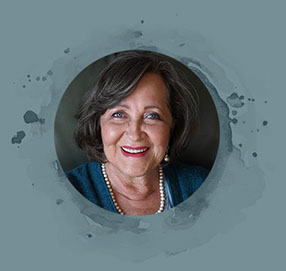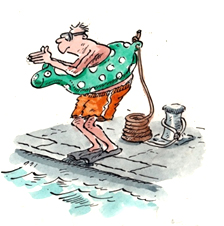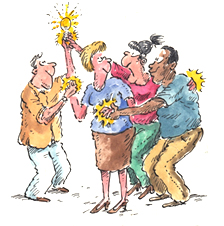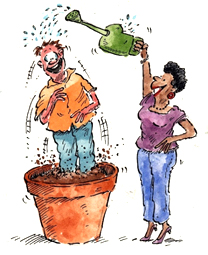CLICK LINKS BELOW TO VIEW ARTICLES:
MINDFUL RETIREMENT - Exploring the Psychology
MINDFUL RETIREMENT - Out to pasture or a vibrant encore?
RETIREMENT READINESS - Is your parachute in order?
MOTIVATION - The lion or the lighthouse, which do you prefer?
WHAT MAKES YOU TICK? - Understanding our basic human needs
RETIREMENT STRESS - Not a walk on the beach
RETIREMENT STRESS - Daily hassles , beware of the little foxes
COPING WITH STRESS - Uplifts and how to create them


UNDERSTANDING OUR BASIC HUMAN NEEDS
- by Dr Hannetjie
Hi again from Hannetjie,
Today I want to explore with you something that we tend to take for granted – that is, until we do not have it anymore – attention. This is one of the great pitfalls of retirement and older age, but it does not have to be.
Our physical needs are constantly craving satisfaction. No sooner have we met one of them, when another arises. Our days seem to be filled with finding food, making sure we are safe and caring for others. But one of our most important needs is for attention (human contact and company). This need is profoundly activated when we retire, leave a busy work-environment or when friends and relatives move away – leaving us lonely and feeling very abandoned. (See Block about Transactional Analysis and Strokes). However, when we are pre-warned about such situations, we can, and should, learn to manage the attrition in our social lives.
Besides the need for basic safety, food, water, air and attention, there are six other very important psychological and spiritual needs that we have to manage if we want to feel happy and fulfilled. They are the needs for security, variety, significance, connection, growth and contribution. (Anthony Robbins explains them beautifully. Find him on YouTube and TED talks on the subject). We could also see them as variations on the need for attention.
NEED 1. CERTAINTY, SAFETY AND SECURITY
This need is about assurance that we can avoid pain and gain pleasure and that there are some things in life that can be predictable and comfortable.
Our challenge: How to feel comfortable and at home in familiar surroundings whilst challenging ourselves and our boundaries so as not to get stuck in old ruts. We want to feel safe enough to try new things – new ways of being and living.
(Original cartoon by Bill Stott, from Distilled Wisdom the Moon)
NEED 2. VARIETY AND NOVELTY
The need for variety and novelty is about exploration of the unknown, change, new experiences and stimuli – to keep feeling alive.
We envisage trying out many different and unusual activities. Some of the activities to bring variety (safely), would be to visit new restaurants, meet new speakers, read and explore a wide range of topics.
POINTS TO PONDER:
The needs for security and variety seem to be diametrically opposed to one another. Most people find that as soon as there is enough security, the need for variety and change makes itself known. This could be problematic if one doesn’t know how to get these needs fulfilled in appropriate ways, don’t you agree?
So the challenge then for all of us, is to find ways to manage and fulfil our needs in such a way as to not cause harm to ourselves, others or our existing relationships.
What are your particular needs for safety and security – in the world and also in your relationships?
What would happen if you and your partner have differing needs for variety and security? How can both be satisfied in a mature relationship?
THE NEEDS FOR 3. SIGNIFICANCE AND 4. CONNECTION
The need for significance is about feeling unique, important, special or needed. It is about making an impact in your world.
The need for connection is about having a strong bond with someone - a feeling of closeness with someone or something.
These two needs are very interconnected. Through our close bonds with one another we not only create a sense of community, but can also develop (Original cartoon by Bill Stott, for Hannetjie Edeling) a great support system and achieve significance. Each person in the group has their part to play, and when the link is broken, the whole group loses out.
Togetherness and support are such essential ingredients for ageing positively. But there is more. In this connected system, when we work together and are there for each other, we can make miracles happen and synergistically achieve outcomes that one could not have foreseen from just adding up the sum of the parts. These are also great ways to get the contact strokes that we need.
For many of us, when we are younger, family and work come with built-in mechanisms to meet our needs for care, connection, significance and contribution. In fact, sometimes life is so demanding that we find it almost impossible to think that things could be different.
But, all to soon we find ourselves in the position where we are about to, or have already retired, children have left home or the country and support systems implode around us. What was taken for granted before, now seems quite a daunting task. Research shows us that loneliness is one of the greatest predictors of ageing badly – so let’s benefit from other’s experience and choose to be pro-active. Gene Cohen, one of my favourite researchers, advises that we actively develop our social portfolios, just as we would a financial one. We need to purposefully pursue different types of activities and build relationships with people to ensure a lovely later life. (Read more about this in my book Over The {Hill} Moon – a guide to Positive Ageing).
(Original cartoon by Bill Stott, from (Original cartoon by Bill Stott, from Distilled Wisdom the Moon)
5. THE NEED FOR PERSONAL GROWTH
The need for personal growth is about expanding our capacity, capability or understanding - the alternative is to become stagnant or die.
Research shows unequivocally that lifelong learning is one of the finest ways to promote personal growth and one of the master keys to successful living and ageing. Besides that, it also keeps us interesting as friends and partners.
We can keep our brains active by forming new neuronal pathways, despite old ones deteriorating.
(Original cartoon by Bill Stott, from Over the {Hill} Moon)
But remember, it has to be a new learning to form new pathways around the deteriorating neural pathways. (Read about the marvellous Sisters of Notre Dame in Distilled Wisdom and how their learning has helped them in many ways, including fending off Alzheimer’s deterioration).
But, personal growth comes from more than just learning. It comes especially from continued social involvement and broadening of our emotional intelligence and communication skills - especially too with people younger than ourselves and from different walks of life.
TO PONDER: What affordable activity can you begin that will help your mind expand? Do you by any chance have a dormant hobby to explore again such as painting or playing a music instrument?
(Original cartoon by Bill Stott, from (Original cartoon by Bill Stott, from Distilled Wisdom the Moon)
6. THE NEED FOR CONTRIBUTION
This need is about a sense of service and focus on helping, giving to and supporting others. As with most of our needs, these can be overburdened by caring for our growing families when they are young. Once children have left home, we have to find different ways of giving support. Through finding new friends, offering a helping hand in the group and even supporting some charities, our contribution needs can be met exceptionally well. By reaching out to others in the group, we can form new bonds and support systems that are satisfying and rewarding, and it doesn’t have to cost much money – mainly time and care.
ACTION POINTS
• What about setting up a check-in system by SMS or WhatsApp to see if your friends are ok in the morning, or have arrived home safely?
• There is also the other side of the giving coin. We might just be in a position where we need to be cared for or look to others for support. Perhaps we could see the divine balance in this situation – affording others the opportunity to care, and for us to receive graciously.
Let’s grow and choose an inspirational and connected lifestyle going forward. Let’s choose to get our needs met in positive ways.
Blessings,
Dr Hannetjie
Strokes - In Transactional Analysis a stroke is a unit of recognition or attention, and not a brain haemorrhage. Stokes may be physical, as in stroking a cat or a baby’s head, but in most cases, strokes are given by words or by body language. For example, to say “Hallo” is a small positive stroke; to say “Hallo, how are you?” is a better positive stroke; and “Hallo X (person’s name), how are you?” is an even better positive stroke. Adding in a hug, a smile and a look of delight will increase the value of the stroke further. Strokes are also worth more when coming from a valued stroke provider – someone whom one loves, trust or respects, rather than from someone whom you do not value or respect.
DID YOU KNOW?
We need attention/strokes like we need food, water and air. It is described as having attention hunger or attention need.
Everything that we do is for attention and we will do anything to get these strokes if they are not forthcoming at a rate that satisfies us.
Distinguish between positive and negative strokes, unconditional and conditional strokes.
We cannot control unconditional strokes, but we can control conditional strokes.
Behaviour that is rewarded will continue and behaviour that is not rewarded cannot continue.
Be mindful of reward patterns (secondary gain, hypochondria, etc.) where negative strokes are concerned.
We feel good when we get positive strokes and terrible when we get negative strokes, but some attention is better than nothing.
Being ignored is worse than negative stokes – hence solitary confinement as effective punishment. This also happens to us when we relocate or our friendship circle dwindles, particularly after retirement.
We can train people into better behaviour by how we reward them.
Remember, the mere fact that you are giving attention is a reward and whether the attention is good or bad, does not make much difference.
We can learn to give and receive better quality strokes than those we may have become accustomed to.
Asking for strokes is OK and they are worth (almost) as much as unsolicited (positive) strokes.
Do read Marianne’s companion piece on the Bridge Website – “What is Missing?”




INFORMATION TO BE USED AT YOUR OWN RISK.
Any suggestions or opinions voiced in these pages are those of the authors, and in no way to be constructed as final treatment advice. They are intended as a starting point to develop your own preparation and treatment plan. Please consult your medical and/or psychological experts or caregivers to fine-tune the advice and suggestions for your own unique needs.






